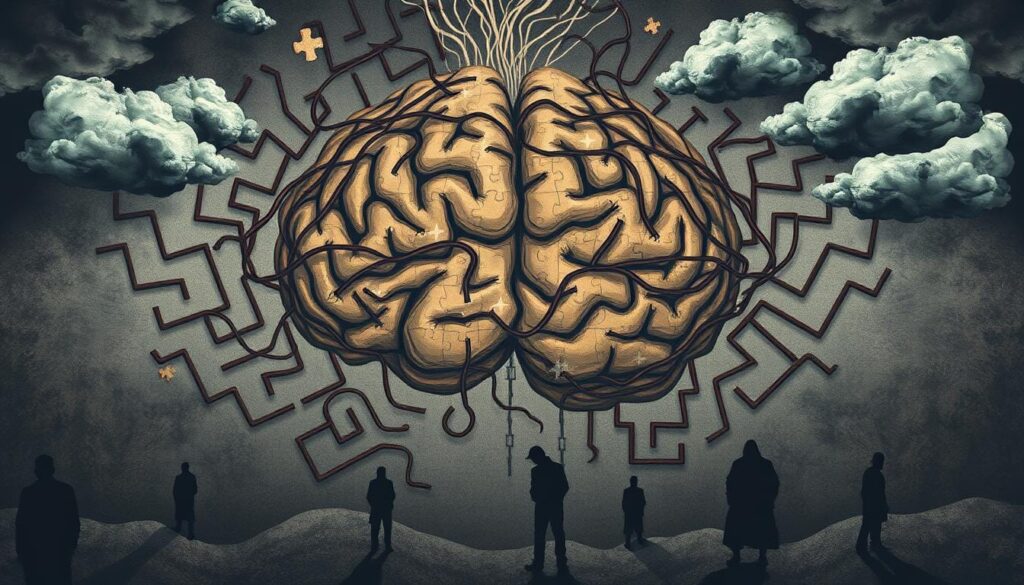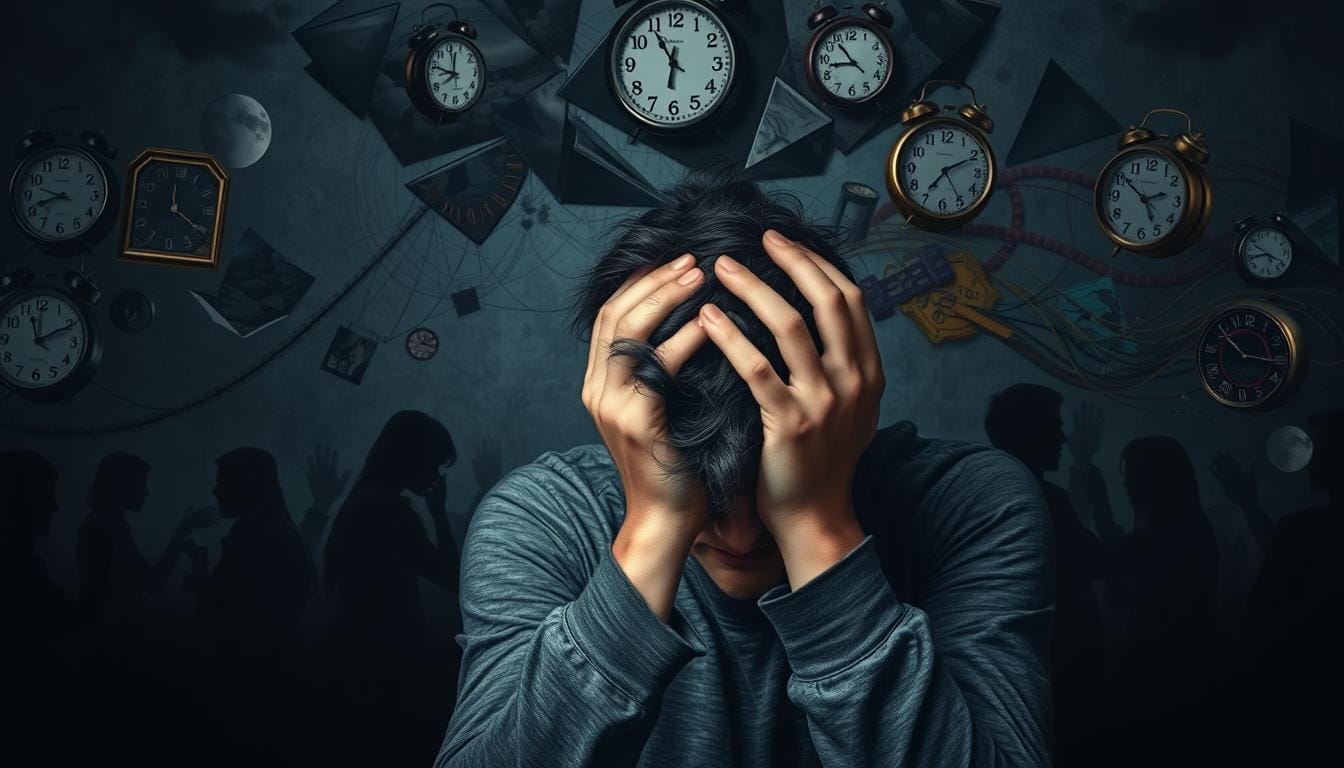As someone who has struggled with anxiety myself, I know firsthand the debilitating impact it can have on daily life. Anxiety disorders are more common than you might think, affecting millions of Americans every year. In fact, according to the National Institute of Mental Health, a staggering 23% of adults in the United States live with some form of mental illness.
The challenge is that anxiety can manifest in various ways, making it difficult to recognize the signs of a more severe problem. What may start as normal worrying can quickly spiral into a chronic, uncontrollable state that significantly interferes with your ability to function. That’s why it’s so important to understand the red flags of bad anxiety and know when to seek help.
Key Takeaways
- Generalized anxiety disorder (GAD) affects people who experience constant and chronic worrying, nervousness, and tension.
- Symptoms of GAD include persistent worrying, uncontrollable anxiety, intrusive thoughts, and physical symptoms like muscle tension and sleep disturbances.
- Differentiating between normal stress and severe anxiety is crucial, as GAD can significantly disrupt daily life and activities.
- Early intervention is key, as addressing anxiety disorders can help prevent long-term consequences on mental and physical health.
- Recognizing the signs of bad anxiety, such as changes in behavior, cognition, and emotions, can empower you to take proactive steps towards managing your mental well-being.
What is Anxiety?
Anxiety is a natural human emotion that everyone experiences at times. However, for some individuals, anxiety can become a persistent and debilitating condition, leading to a range of physical, emotional, and behavioral symptoms that significantly impact their daily lives. Understanding the nature of anxiety disorders is crucial in identifying and addressing the challenges they pose.
Definition of Anxiety Disorders
Anxiety disorders are a group of mental health conditions characterized by excessive and persistent worry, fear, and tension that interfere with normal functioning. These disorders are among the most common mental health issues, affecting millions of people worldwide.
Types of Anxiety Disorders
- Generalized Anxiety Disorder (GAD)
- Panic Disorder
- Social Anxiety Disorder
- Obsessive-Compulsive Disorder (OCD)
- Post-Traumatic Stress Disorder (PTSD)
- Phobias
Common Symptoms of Anxiety
Individuals experiencing anxiety may exhibit a range of physical, emotional, and behavioral symptoms, including persistent worrying, restlessness, difficulty concentrating, irritability, muscle tension, fatigue, and physical manifestations like rapid heartbeat and sweating. These symptoms can significantly disrupt daily functioning and overall well-being.
Recognizing the signs and symptoms of anxiety disorders is crucial for seeking appropriate support and treatment. By understanding the nature of these conditions, we can better navigate the challenges they present and take steps toward managing and overcoming them.
How Bad Anxiety Differs from Normal Stress
While stress is a natural and often healthy response to the challenges we face, severe anxiety can be a significantly more intense, long-lasting, and disproportionate reaction. Understanding the differences between stress and anxiety is crucial for recognizing when our worries have become a serious issue that requires attention.
Understanding Stress vs. Anxiety
Stress is generally proportional to the event or situation that triggers it. It comes on suddenly and tends to subside just as quickly once the stressful circumstance has passed. Anxiety, on the other hand, is often disproportionate to its trigger and can persist long after the original cause has been resolved.
Chronic stress can result from ongoing problems like financial troubles, health concerns, or an unhealthy living situation. Anxiety disorders, however, can be triggered by external events but often flare up without an obvious stressor, causing uncontrollable worry and tension.
Signs that Anxiety is Becoming Severe
While occasional anxiety is a normal part of life, there are several red flags that indicate when it has become a serious problem:
- Uncontrollable worrying that interferes with daily activities
- Inability to relax or unwind, even in the absence of a clear stressor
- Significant disruption to work, relationships, and personal goals
- Persistent physical symptoms like insomnia, fatigue, or muscle tension
If you’re experiencing these symptoms of recognizing anxiety attacks and high anxiety red flags, it may be time to seek professional help to manage your anxiety and reclaim control over your life.
Recognizing Physical Signs of Bad Anxiety
Severe anxiety can manifest in a variety of physical symptoms that significantly impact our daily lives. From insomnia and sleep disturbances to chronic fatigue and persistent muscle tension, these physical signs are important to recognize and address.
Insomnia and Sleep Disturbances
One of the most common physical indicators of overwhelming anxiety is difficulty falling asleep or staying asleep. Individuals struggling with anxiety may find themselves tossing and turning at night, unable to quiet their racing thoughts. This can lead to daytime exhaustion, further exacerbating the cycle of anxiety.
Fatigue and Low Energy
Chronic fatigue is another hallmark of severe anxiety. Individuals may experience a persistent lack of energy, making even the simplest tasks feel like a tremendous effort. This exhaustion can stem from both the physiological effects of anxiety and the disruption to sleep patterns.
Muscle Tension and Headaches
Anxiety can also manifest physically through muscle tension, which can lead to persistent aches, pains, and headaches. This tension can be especially pronounced in the neck, shoulders, and back, causing discomfort and impacting overall well-being.
These physical signs of bad anxiety can significantly impact our daily functioning and overall quality of life. Recognizing and addressing these symptoms is crucial for managing anxiety and reclaiming our health and well-being.
“Anxiety is like a rocking chair. It gives you something to do, but it doesn’t get you very far.” – Jodi Picoult
Identifying Emotional Indicators of Anxiety
Anxiety disorders can manifest through a range of emotional symptoms that significantly impact daily life. One of the primary signs of bad anxiety is persistent and excessive worrying. Individuals with anxiety may find themselves consumed by concerns about everyday situations, unable to control their thought patterns.
Another common emotional indicator of severe anxiety is a pervasive sense of dread or impending doom. Even in non-threatening circumstances, those struggling with anxiety may experience a persistent feeling that something terrible is about to happen. This overwhelming sense of foreboding can lead to social withdrawal and strained relationships.
Irritability and Mood Swings
Irritability and unpredictable mood swings are also hallmarks of bad anxiety. Individuals may find themselves becoming easily frustrated, snapping at loved ones, or experiencing sudden shifts in their emotional state. This emotional volatility can further exacerbate anxiety, creating a vicious cycle.
Recognizing these emotional signs of anxiety is crucial for seeking appropriate treatment and support. By understanding the psychological factors contributing to anxiety, individuals can take proactive steps to manage their symptoms and improve their overall well-being.

“Anxiety is a thin stream of fear trickling through the mind. If encouraged, it cuts a channel into which all other thoughts are drained.” – Arthur Somers Roche
Behavioral Changes Associated with Bad Anxiety
Severe anxiety can often lead to significant behavioral changes that profoundly impact an individual’s daily life and relationships. One of the most common responses to debilitating anxiety signals is the avoidance of anxiety-provoking situations. This coping mechanism may limit personal and professional opportunities, as individuals tend to steer clear of activities or environments that trigger their anxiety.
Furthermore, changes in eating habits are frequently observed in those struggling with coping with extreme anxiety. Some individuals may turn to overeating as a means of soothing their anxious thoughts, while others may experience a complete loss of appetite. These behavioral shifts can have detrimental effects on physical health and overall wellbeing.
Lastly, the decline in social interactions is another hallmark of severe anxiety. As individuals withdraw from friends, family, and social activities, they may find themselves increasingly isolated and disconnected from their support systems. This withdrawal can further exacerbate feelings of anxiety, creating a vicious cycle that can be challenging to break.
Avoidance of Certain Situations
Individuals with debilitating anxiety often find themselves avoiding situations or activities that trigger their anxious responses. This avoidance can lead to a narrowing of their personal and professional opportunities, as they steer clear of anything that may provoke their anxiety.
Changes in Eating Habits
Anxiety can have a significant impact on eating habits, with some individuals turning to overeating as a coping mechanism, while others may experience a complete loss of appetite. These behavioral changes can have detrimental effects on physical health and overall wellbeing.
Decline in Social Interactions
As individuals with severe anxiety withdraw from social activities and interactions, they may find themselves increasingly isolated and disconnected from their support systems. This withdrawal can further exacerbate feelings of anxiety, creating a vicious cycle that can be challenging to break.
“Anxiety can have a profound impact on an individual’s behavior, leading to avoidance, changes in eating habits, and a decline in social interactions. These behavioral changes can significantly disrupt daily life and relationships, underscoring the importance of seeking professional help to manage severe anxiety.”
Cognitive Symptoms of Severe Anxiety
Severe anxiety can have a profound impact on our cognitive abilities, leading to a range of concerning symptoms that can significantly disrupt our daily lives. Among the most prevalent cognitive symptoms of acute anxiety warning signs are difficulty concentrating, memory problems, and racing thoughts.
Difficulty Concentrating
When anxiety levels spike, our ability to focus and concentrate on tasks can become severely impaired. The overwhelming anxiety indicators can make it challenging to stay present and engaged, as our mind becomes consumed by worries, fears, and catastrophic thinking. This can lead to decreased productivity, poor decision-making, and difficulty completing even routine tasks.
Memory Problems
Severe anxiety can also take a toll on our memory, causing us to experience forgetfulness and difficulty retaining information. The cognitive strain of racing thoughts and persistent worry can interfere with our ability to encode and recall memories, leading to frustration and a sense of mental exhaustion.
Racing Thoughts
One of the most distressing cognitive symptoms of overwhelming anxiety is the experience of racing thoughts. These intrusive, rapid-fire thoughts often focus on worst-case scenarios, fueling a cycle of worry and apprehension. The inability to control these thoughts can be mentally and physically draining, further exacerbating the anxiety response.
Recognizing and addressing these cognitive symptoms of severe anxiety is crucial for managing the condition and regaining a sense of control over our mental well-being. By seeking professional support and implementing effective coping strategies, we can work to mitigate the impact of these acute anxiety warning signs and improve our overall cognitive functioning.

| Symptom | Description |
|---|---|
| Difficulty Concentrating | The overwhelming anxiety indicators can make it challenging to stay present and engaged, leading to decreased productivity and poor decision-making. |
| Memory Problems | Severe anxiety can interfere with our ability to encode and recall memories, causing forgetfulness and a sense of mental exhaustion. |
| Racing Thoughts | Intrusive, rapid-fire thoughts that often focus on worst-case scenarios, fueling a cycle of worry and apprehension. |
The Impact of Bad Anxiety on Daily Life
Severe anxiety can have a significant impact on various aspects of daily life. From work and productivity to personal relationships and goal-setting, the debilitating anxiety signals can create profound challenges for those struggling with intense anxiety.
Effects on Work and Productivity
Anxiety disorders can significantly hinder workplace performance. Individuals may experience decreased productivity, difficulty meeting deadlines, and increased absenteeism due to the overwhelming nature of their anxiety symptoms. The constant state of worry and tension can make it challenging to focus on tasks, leading to a decline in overall work output.
Consequences for Relationships
Severe anxiety can also take a toll on personal relationships. Individuals may withdraw from social interactions, become irritable, or develop a heightened dependency on their loved ones, straining the dynamics within their support system. The emotional turmoil associated with managing intense anxiety can make it challenging to maintain healthy, fulfilling relationships.
Limitations on Personal Goals
Anxiety disorders can also hinder individuals from pursuing their personal goals and aspirations. The lack of confidence, fear of failure, and avoidance of certain situations can prevent individuals from taking risks, exploring new opportunities, or stepping out of their comfort zones. This can lead to a sense of stagnation and unfulfillment, further exacerbating the negative impact of anxiety on daily life.
Addressing the effects of severe anxiety on various aspects of life is crucial for individuals seeking to regain control and achieve a greater sense of overall well-being. By recognizing the multifaceted impact of anxiety and seeking appropriate support, individuals can work towards managing their symptoms and reclaiming their daily lives.
The Role of Genetics in Anxiety Disorders
Genetics play a crucial role in the development of severe anxiety disorders. Studies have shown that individuals with a family history of anxiety are more likely to develop these conditions. Identical twins, for example, are more likely to both have anxiety or depression compared to fraternal twins, suggesting a hereditary link.
Family History and Heredity
Close family members, such as twins, parents, or siblings with anxiety or depression, increase the likelihood of inheriting a tendency for these mental health conditions. Family members often share environmental and lifestyle factors, complicating the understanding of the role of genetics. However, research has indicated that family members are more likely to develop anxiety or depression if these conditions manifest before the age of 20.
Studies on Genetic Factors
While no single gene that causes severe anxiety disorders has been identified, studies have revealed that certain genetic variants may contribute to the susceptibility of these conditions. For instance, variants in the BDNF gene, which influences stress response regulation, have been linked to an increased risk of anxiety disorders. Additionally, pharmacogenetics, which analyzes genetic variants associated with medication metabolism, can help in more effective anxiety treatment.
It’s important to note that genetics alone do not determine the development of anxiety disorders. Environmental factors, such as stressful life events, social relationships, and lifestyle choices, also play a significant role in the manifestation and progression of these conditions. A comprehensive approach that considers both genetic and environmental factors is crucial for understanding and addressing severe anxiety disorders.

Worldwide, one in 13 people suffers from anxiety, according to the World Health Organization. Despite its high treatment potential, nearly half of individuals diagnosed with anxiety disorders receive the necessary treatment. By understanding the genetic and environmental factors contributing to severe anxiety, we can work towards earlier detection, more personalized interventions, and improved mental health outcomes for those affected.
Environmental Factors Contributing to Anxiety
Anxiety disorders can be significantly influenced by various environmental factors. [Stressful life events](https://www.medicalnewstoday.com/articles/323456), such as trauma, loss, or major life changes, can act as triggers, exacerbating signs of bad anxiety and leading to the development of acute anxiety warning signs. Additionally, our social relationships, including family dynamics and peer interactions, can also play a crucial role in shaping our anxiety levels.
Stressful Life Events
Chronic stress, abuse, and neglect are all risk factors for developing anxiety disorders. These stressful life experiences can have a profound impact on our mental well-being, making us more vulnerable to the onset and severity of signs of bad anxiety.
Influence of Social Relationships
Our social relationships, both within our families and among our peers, can significantly influence our susceptibility to acute anxiety warning signs. Dysfunctional family dynamics, lack of social support, and experiences of discrimination or rejection can all contribute to the development and exacerbation of anxiety disorders.
“Anxiety disorders affect nearly 30% of adults at some point in their lives.” – American Psychiatric Association, 2023
Environmental factors, such as the ones discussed above, play a crucial role in the onset and progression of anxiety disorders. By understanding the impact of these factors, we can better recognize the signs of bad anxiety and take proactive steps to address the acute anxiety warning signs that may arise.
Identifying Triggers of Bad Anxiety
Recognizing the triggers that can set off episodes of severe anxiety is a crucial step in managing this mental health condition. Understanding the common triggers in everyday life, as well as learning to cope with unexpected triggers, can help individuals gain more control over their anxiety and prevent it from disrupting their daily lives.
Common Triggers in Everyday Life
Numerous aspects of daily living can serve as triggers for individuals with anxiety disorders. Some of the most common triggers include:
- Work-related stress and deadlines
- Financial concerns or economic instability
- Health issues, either one’s own or a loved one’s
- Relationship problems or conflicts with family and friends
Coping with Unexpected Triggers
In addition to the predictable triggers, individuals with anxiety may also face unexpected situations that can suddenly provoke intense feelings of fear or panic. These can include:
- Sudden changes in routine or environment
- Exposure to crowded or unfamiliar social settings
- Specific phobias, such as heights, public speaking, or certain animals
Developing coping strategies to address these unexpected triggers is crucial for managing recognizing anxiety attacks and coping with extreme anxiety. Techniques like deep breathing, mindfulness, and seeking support from loved ones can help individuals regain a sense of control and prevent anxiety from spiraling out of control.
| Trigger | Prevalence |
|---|---|
| Consumption of caffeine | 68% of individuals with anxiety disorders |
| Financial distress or concerns | 64% of individuals with anxiety disorders |
| Conflict or relationship problems | 53% of individuals with anxiety disorders |
| Lack of sleep or poor quality sleep | 60% of individuals with anxiety disorders |
| Relationship problems | 45% of individuals with anxiety disorders |
| Substance abuse | 29% of individuals with anxiety disorders |
By proactively identifying and addressing the unique triggers that contribute to their anxiety, individuals can take important steps towards managing this mental health condition and reclaiming their wellbeing.

How Bad Anxiety Affects Physical Health
Severe anxiety can have a significant impact on our physical well-being. Chronic anxiety is closely linked to an increased risk of developing various health issues, including cardiovascular disease, gastrointestinal disorders, and respiratory problems. Additionally, anxiety can weaken our immune system, making us more susceptible to infections and illnesses.
Connection Between Anxiety and Chronic Illness
Approximately a third of U.S. adults will experience an anxiety disorder at some point in their lives, and the prevalence is on the rise, particularly among younger adults. Chronic stress and anxiety can trigger the release of hormones like cortisol and adrenaline, which can contribute to the development of chronic illnesses over time. For instance, anxiety has been associated with an increased risk of heart disease, as it can lead to elevated blood pressure and inflammation in the body.
Impact on the Immune System
Anxiety can also have a detrimental effect on our immune system. When we experience persistent anxiety, our body’s stress response can become overactivated, leading to chronic inflammation. This chronic inflammation can weaken the immune system, making us more susceptible to infections and illnesses. Studies have shown that individuals with anxiety disorders are more likely to report frequent colds, flu, and other respiratory infections.
Moreover, anxiety can manifest in physical symptoms, such as headaches, muscle tension, and digestive issues. Headaches associated with anxiety often present as a persistent, dull ache, typically concentrated around the forehead or temples. Stomach problems, like nausea and gastrointestinal discomfort, can also be linked to the nervous system’s response to stress.
| Symptom | Description | Impact |
|---|---|---|
| Headaches | Persistent, dull ache around the forehead or temples | Chronic pain and discomfort |
| Muscle Tension | Concentrated in the neck, shoulders, and back | Chronic pain and reduced mobility |
| Digestive Issues | Nausea, gastrointestinal discomfort | Disruption of digestive function and overall well-being |
Addressing the physical symptoms of anxiety is crucial for maintaining overall health and well-being. Seeking professional help, practicing relaxation techniques, and implementing lifestyle changes can be effective in managing the physical manifestations of severe anxiety symptoms and overwhelming anxiety indicators.
When to Seek Professional Help
Recognizing the signs of bad anxiety is crucial, as ignoring these warning signs can lead to the worsening of symptoms and a significant impact on daily life. If your anxiety becomes persistent, overwhelming, and interferes with your ability to work, study, engage socially, or perform daily tasks, it may be time to seek professional help.
Warning Signs That Require Attention
Persistent worry lasting six months or more, recurrent panic attacks, avoidance of certain situations, and physical symptoms such as chronic fatigue, headaches, and digestive issues are all signs that your anxiety has become severe and requires professional intervention. Recognizing anxiety attacks and identifying acute anxiety warning signs are the first steps in addressing the problem effectively.
The Importance of Early Intervention
Early intervention is crucial for managing anxiety disorders. Seeking help from a mental health professional can lead to a proper diagnosis and the development of a tailored treatment plan. Various effective therapies, such as Cognitive Behavioral Therapy (CBT), Exposure Therapy, and Dialectical Behavior Therapy (DBT), can help you develop coping strategies and replace negative thought patterns with positive reactions and rational thinking. Medications, such as Selective Serotonin Reuptake Inhibitors (SSRIs) and Serotonin-Norepinephrine Reuptake Inhibitors (SNRIs), may also be prescribed to alleviate the symptoms of anxiety.
According to the National Institute of Mental Health, about a third of American women and men suffer from an anxiety disorder at some point during their lives. By seeking professional help and addressing the issue early on, you can take control of your mental health and improve your overall quality of life.
“Cognitive behavioral therapy and psychodynamic therapy can be very effective in helping people manage anxiety disorders.”
Types of Treatments for Bad Anxiety
Managing intense anxiety or coping with extreme anxiety can be a daunting challenge, but there are effective treatments available. Two primary approaches to addressing severe anxiety are therapy and medication.
Therapy Options
Cognitive Behavioral Therapy (CBT) is a widely used therapeutic approach for anxiety disorders. CBT helps individuals identify and change the negative thought patterns that contribute to their anxiety. Through this process, patients learn to replace unhelpful thoughts with more realistic and adaptive perspectives.
Exposure therapy is another effective treatment for severe anxiety. This approach gradually exposes patients to the situations or stimuli that trigger their anxiety, allowing them to confront and overcome their fears in a controlled environment.
Medications for Anxiety Disorders
- Antidepressants, such as selective serotonin reuptake inhibitors (SSRIs), can be prescribed to manage the symptoms of anxiety disorders.
- Anti-anxiety medications, including benzodiazepines, can provide quick relief for acute anxiety episodes but may carry a risk of dependency.
- Antihistamines and beta-blockers can also be used to alleviate physical symptoms of anxiety, such as rapid heartbeat or muscle tension.
In many cases, a combination of therapy and medication yields the best results for individuals struggling with managing intense anxiety or coping with extreme anxiety. It’s essential to work closely with healthcare professionals to develop a comprehensive treatment plan that addresses the unique needs and challenges faced by each patient.
“Anxiety is not something you have to live with forever. With the right treatment and support, it is possible to manage and overcome the challenges of severe anxiety.”
Self-Help Strategies for Managing Anxiety
Dealing with intense anxiety or extreme anxiety can be challenging, but there are various self-help strategies you can adopt to manage these overwhelming feelings. By incorporating mindfulness and relaxation techniques, as well as making lifestyle changes, you can take proactive steps to improve your mental well-being and cope with anxiety more effectively.
Mindfulness and Relaxation Techniques
Mindfulness-based practices can be incredibly beneficial for managing anxiety. Engaging in deep breathing exercises, meditation, and progressive muscle relaxation can help you stay present in the moment, interrupt anxious thoughts, and ease stress. Grounding techniques that focus on your senses, such as sight, sound, smell, taste, and touch, can also be effective in anchoring you to the present and reducing anxiety symptoms.
Lifestyle Changes to Reduce Anxiety
Making certain lifestyle adjustments can have a significant impact on your ability to manage intense anxiety or extreme anxiety. Regular physical activity, such as short bursts of exercise like walking, running, or dancing, can release brain chemicals that alleviate tension and boost your mood. Maintaining a healthy, balanced diet rich in complex carbohydrates and omega-3 fatty acids can also contribute to improved mental well-being. Additionally, limiting your intake of caffeine and alcohol, which can exacerbate anxiety symptoms, and ensuring you get enough quality sleep can be beneficial.
Developing a consistent self-care routine that incorporates these strategies can be crucial for long-term anxiety management. By taking an active role in managing your anxiety through self-help techniques, you can learn to better cope with the challenges of intense or extreme anxiety and improve your overall quality of life.
| Self-Help Strategies | Benefits |
|---|---|
| Mindfulness and Relaxation Techniques |
|
| Lifestyle Changes |
|
“Anxiety is the handmaiden of creativity.” – T.S. Eliot
By incorporating a combination of mindfulness, relaxation techniques, and lifestyle changes, individuals struggling with managing intense anxiety or coping with extreme anxiety can take proactive steps to improve their mental well-being and manage their symptoms more effectively.
The Importance of Support Systems
Navigating the challenges of coping with extreme anxiety can feel isolating, but building a strong support system can make all the difference. Community resources, such as support groups, mental health clinics, and online forums, can provide invaluable assistance and information to individuals struggling with intense anxiety. These outlets offer a safe space to share experiences, learn coping strategies, and connect with others who understand the unique challenges of managing anxiety disorders.
In addition to professional support, cultivating a network of caring friends, family members, and trusted mental health providers is essential for long-term anxiety management. Open communication about anxiety symptoms and needs can help strengthen these relationships, ensuring loved ones are better equipped to provide the emotional and practical support required during difficult times. Research shows that perceived social support has a more significant impact on mental health than the actual support received, underscoring the importance of building a robust support system tailored to individual needs.
By taking proactive steps to access community resources and nurture a network of support, individuals can empower themselves to effectively cope with extreme anxiety and manage intense anxiety symptoms. This holistic approach can lead to improved mental well-being, better coping mechanisms, and a greater sense of resilience in the face of life’s challenges.

